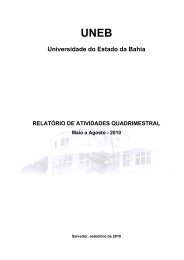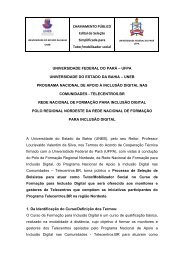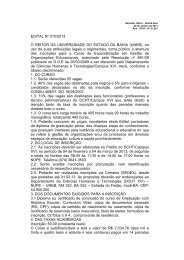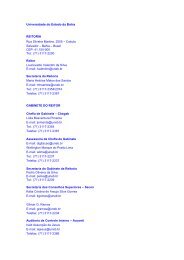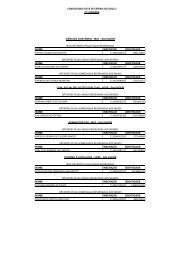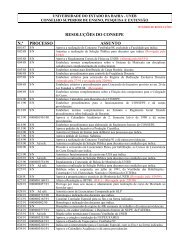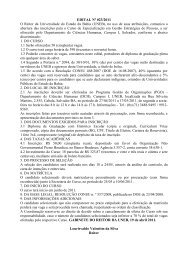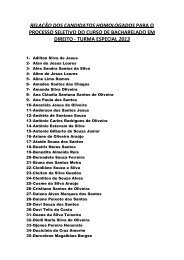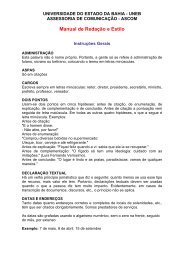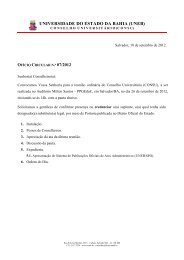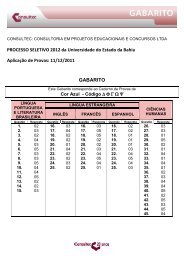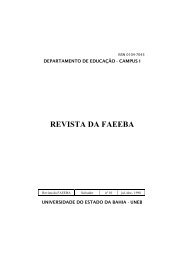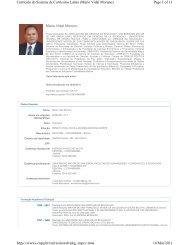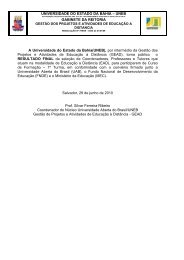Revista da FAEEBA Educação e Contemporaneidade - Uneb
Revista da FAEEBA Educação e Contemporaneidade - Uneb
Revista da FAEEBA Educação e Contemporaneidade - Uneb
Create successful ePaper yourself
Turn your PDF publications into a flip-book with our unique Google optimized e-Paper software.
ding educational and economic success and<br />
Latina/os’ perceived inability to make progress<br />
in these areas, I repeatedly found Latina/os<br />
compared unfavorably to earlier white European<br />
immigrants. Their greater economic marginalization<br />
was seen not as owing to forces<br />
largely beyond their control – discrimination, loss<br />
of manufacturing jobs, globalization, impoverished<br />
homelands – but rather as the product of<br />
their unwillingness to work hard and sacrifice.<br />
Outspoken community elders – descen<strong>da</strong>nts of<br />
the turn-of-the-century southern and eastern<br />
Europeans – envisioned welfare as something<br />
that individuals abused to avoid work 20 :<br />
[Hispanics] seem to feel that they are owed<br />
something (…) [They should] exercise their<br />
rights and return to their native homeland.<br />
America, love it or leave it.” (Letter to the Editor)<br />
[Latinos are responsible for] 90 percent of all<br />
troubles in Arnhem. (…) You people aren’t<br />
wanted here – go get welfare somewhere else.<br />
(Letter to Latino community activists, read at a<br />
school board meeting)<br />
I can’t understand why the Hispanic population<br />
doesn’t want to be educated (…) Do you think<br />
that (…) [European immigrants] were just handed<br />
everything? No, they worked hard. (Speaker #13,<br />
public forum)<br />
Latina/os’ insistence on maintenance of a<br />
distinct ethnic identity and their use of Spanish<br />
in public were held to be choices that represented<br />
their unwillingness to “become” Americans:<br />
Why are these [Puerto Rican] kids doing this?<br />
Why are they not speaking English when they<br />
can? Why aren’t they trying to fit into the<br />
mainstream? (…) There’s never going to be an<br />
American identification if we all have our own<br />
areas. They’re not different than earlier waves.<br />
They worked, they learned the language, and that<br />
was your key to success. (Debra Moskowitz, Euro-<br />
American Spanish language teacher, age thirty)<br />
Keep your heritage and language, speak Spanish<br />
at home or with your friends, but learn to speak<br />
English in school and the outside world if you<br />
want to succeed. [Loud applause from the<br />
audience.] Whether you like it or not, this is an<br />
English-speaking country (…) I myself am<br />
learning Spanish because I want to. You have to<br />
Ellen Bigler<br />
want to learn English. (School board member,<br />
public forum)<br />
They [Latinos] come here, they want their own<br />
ways, they want to change our ways. And our<br />
ways is our ways, and if they want their own<br />
ways, they should go back to wherever they came<br />
from. (Talk show caller)<br />
Latinos, these older Euro-American citizens claimed,<br />
were confronting neither more nor less than<br />
what their own grandparents had confronted.<br />
If there’s been racism in Arnhem school district,<br />
maybe I’m naïve, I don’t know about it. I didn’t<br />
feel it. . . . The Italians were called guineas and<br />
wops, so what’s new, what’s the difference?<br />
(Retired teacher, public forum)<br />
(Speaking to a guest who is upset about her<br />
<strong>da</strong>ughter being called “nigger”) Let me tell you<br />
something. Just like the one lady said, they were<br />
all – what are the Italian people called? Grease<br />
balls, wops, and everything like that. (…) [Did]<br />
they make a big fuss over it, and have trouble in<br />
the community over it? (…) I think it’s [the<br />
complaints in the Latino community about their<br />
treatment] turning a lot of people that did like<br />
the Costa Ricans, the Puerto Ricans, the<br />
Hispanics, I think it’s turning them the other way<br />
a lot. (local talk show caller)<br />
What went unacknowledged in these community<br />
discourses were the structural factors<br />
and the ongoing racism facing Latina/os, differentiating<br />
them from earlier immigrants.<br />
The Latina/o community challenged the picture<br />
painted by the white ethnic senior citizens.<br />
“Difference” was not problematic; they portrayed<br />
it as a positive quality and something that<br />
the nation was founded on. Spanish language<br />
maintenance was not a hindrance, but rather a<br />
strength.<br />
Nowhere in the U.S. Constitution is English the<br />
official language. (…) They left it open so that<br />
people who wanted to come (…) didn’t have to<br />
20 The mid-1990s welfare reforms that put in place policies<br />
profoundly limiting people’s access to welfare were<br />
envisioned as the catalyst for putting people back to work,<br />
and initially deemed a success. The reality was otherwise: it<br />
was the expansion of work opportunities in the late 1990s<br />
boom that meant that people could leave welfare. With<br />
jobs once again in jeopardy, the perceived success of the<br />
cutbacks appears to have been overly optimistic.<br />
<strong>Revista</strong> <strong>da</strong> <strong>FAEEBA</strong> – <strong>Educação</strong> e Contemporanei<strong>da</strong>de, Salvador, v. 15, n. 25, p. 239-257, jan./jun., 2006 249



